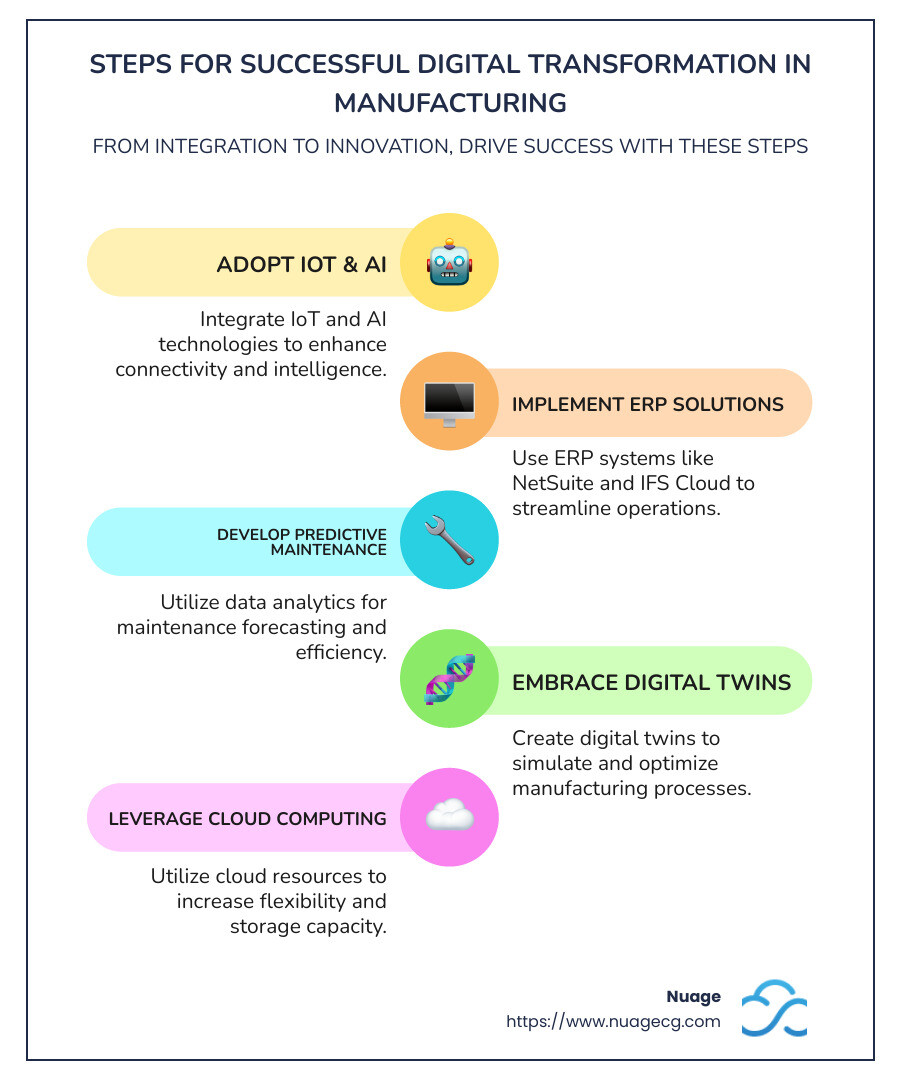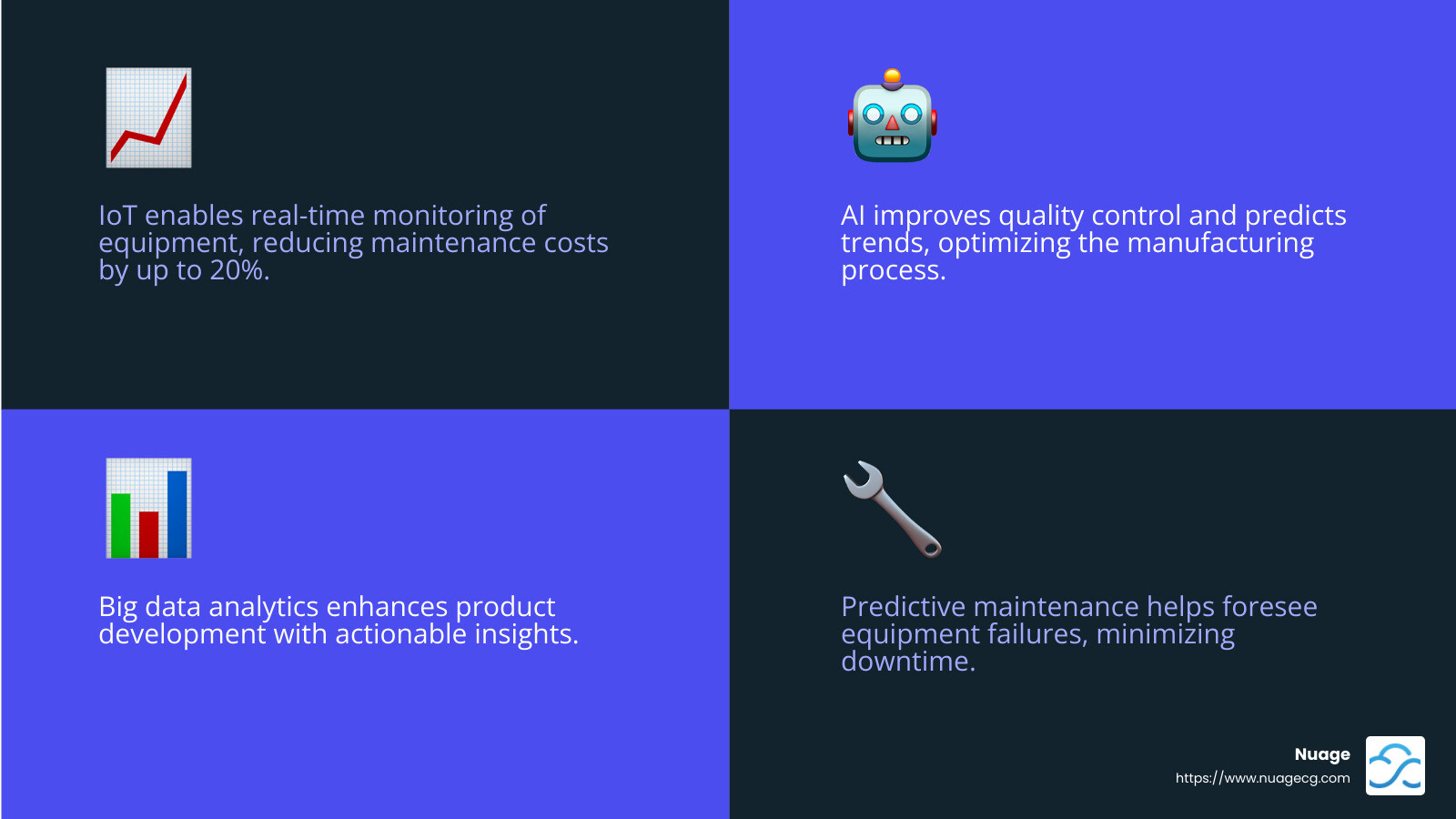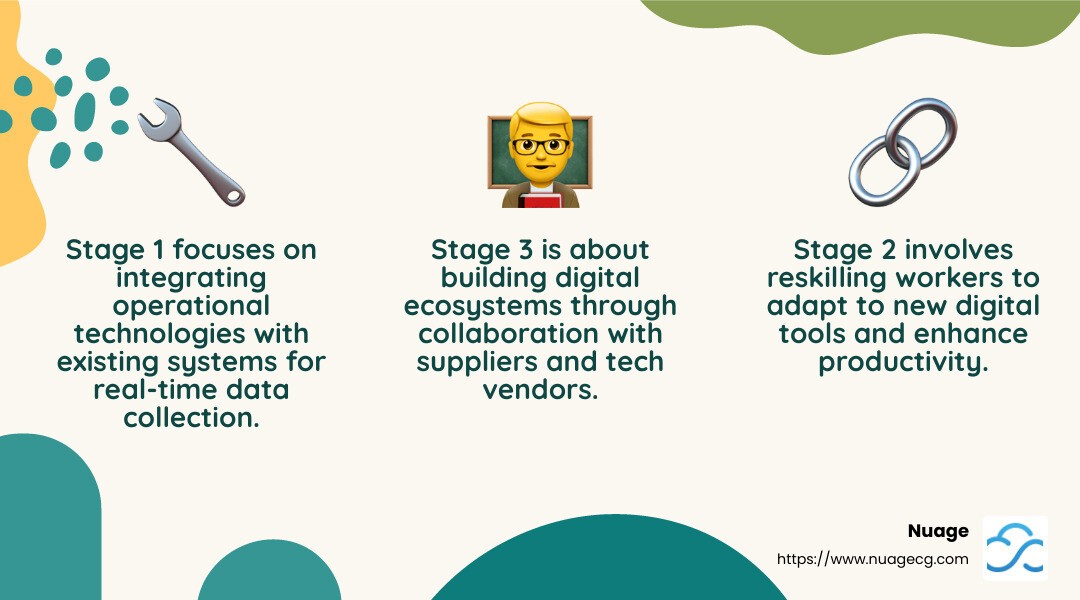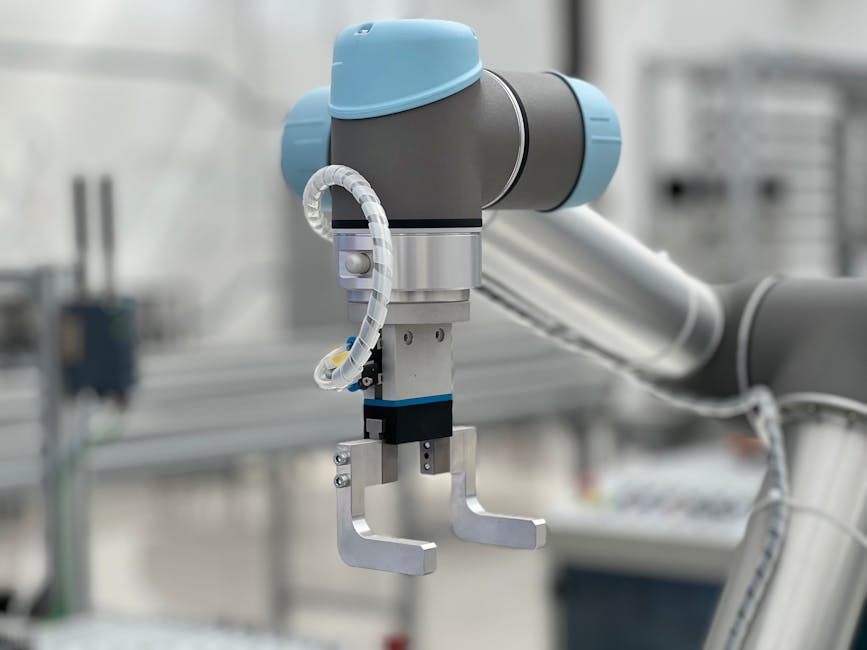Digital transformation for manufacturers: Top 3 Success Tips
Digital change for manufacturers is an essential evolution that integrates digital technologies into traditional manufacturing processes. This change improves efficiency, boosts productivity, and reduces operational costs. Key components include:
- Adoption of cutting-edge technologies like IoT (Internet of Things), AI (Artificial Intelligence), and machine learning.
- Implementation of ERP solutions like NetSuite and to streamline operations and unify data.
- Development of predictive maintenance and digital twins for optimizing manufacturing processes.
In a market that is becoming increasingly competitive, digital change is crucial for manufacturers aiming to stay ahead. Companies are using analytics, robotics, and cloud computing to not only transform how they operate but to reimagine their entire business model.
I’m Louis Balla, a partner at Nuage specializing in enabling companies to realize the full potential of digital change for manufacturers. With over 15 years of experience in digital change and supply chain solutions, I’ve witnessed how ERP systems like NetSuite drive substantial operational changes, ensuring businesses meet and exceed their goals.
Join me as we explore the intricacies and benefits of digital change in manufacturing in the following sections.

Learn more about Digital change for manufacturers:
– ERP for food manufacturing
– ERP systems for manufacturing
Understanding Digital Change in Manufacturing
Welcome to the era of Industry 4.0, where digital transformation for manufacturers is not just a trend but a necessity. This change is driven by several key technologies that are reshaping the industry landscape, making processes smarter and more efficient.
What is Industry 4.0?
Industry 4.0 represents the fourth industrial revolution, characterized by the fusion of advanced technologies like IoT, AI, and big data analytics into manufacturing. This revolution is all about connecting machines, systems, and people in real-time to create a seamless digital ecosystem.
The Role of Digital Technologies
Digital technologies are at the heart of this change. They enable manufacturers to optimize processes, improve productivity, and improve product quality.
-
IoT (Internet of Things): IoT sensors help in monitoring plant operations and equipment, managing inventory, and tracking maintenance. They provide real-time data, making it easier to make informed decisions.
-
AI (Artificial Intelligence) and Machine Learning: AI empowers manufacturers to automate tedious processes, improve quality control, and predict trends. For example, AI can analyze customer order data to ensure timely and accurate deliveries.
-
Big Data Analytics: Big data allows manufacturers to identify trends and improve overall efficiency. It plays a crucial role in product development and supply chain management by providing actionable insights.
Process Optimization
Process optimization is a key benefit of digital change. By integrating these digital technologies, manufacturers can streamline operations, reduce waste, and improve efficiency. For instance, predictive maintenance, enabled by AI and IoT, can foresee equipment failures before they occur, minimizing downtime and extending machinery life.
The Power of Data
Data is the new oil in manufacturing. With big data analytics, companies can transform raw data into actionable insights. This helps in detecting anomalies, identifying trends, and making data-driven decisions that improve operational efficiency.
To support these transformations, manufacturers can leverage solutions like NetSuite and , which offer comprehensive tools for managing operations and enhancing productivity.

By embracing digital change, manufacturers can not only improve their operations but also improve their competitive edge in the market. The integration of these technologies is not just a technological upgrade but a strategic shift towards smarter manufacturing.
As we continue to explore digital change, we will dig into the key stages of digital change for manufacturers, highlighting how these technologies are implemented at various levels.
Key Stages of Digital Change for Manufacturers
Digital change for manufacturers is a journey, not a one-time event. It unfolds in three distinct stages, each critical to achieving a successful digital change.
Stage 1: Integration of Operational Technologies (OT)
The first stage focuses on integrating operational technologies (OT) with existing systems. This means connecting machines and equipment to digital platforms, enabling real-time data collection and monitoring. By doing so, manufacturers can gain insights into production processes, identify inefficiencies, and improve overall equipment effectiveness (OEE).
A compelling example is General Electric’s attempt with their Predix platform. It aimed to harness both OT and IT data, but it highlighted the challenges of using inappropriate metrics at this stage. The lesson here? Choose the right metrics to measure progress, such as equipment uptime and process efficiency, instead of relying solely on traditional ROI measures.
For manufacturers looking to streamline their operations, solutions like NetSuite and offer robust platforms for integrating OT with IT systems, providing comprehensive insights and enhancing operational efficiency.
Stage 2: Reskilling Workers
As technology evolves, so must the workforce. The second stage involves reskilling workers to adapt to new digital tools and processes. This is crucial because technology alone cannot drive change—people do.
Companies must invest in training programs to help employees accept new technologies. This not only boosts productivity but also improves job satisfaction. Successful digital changes require buy-in from both executives and employees. Communicating the benefits of digital change and providing the necessary training can foster a culture of innovation and adaptability.
Stage 3: Building Digital Ecosystems
The final stage is about creating digital ecosystems. This involves collaborating with suppliers, customers, and tech vendors to form a connected network. Such ecosystems enable seamless data exchange and collaboration, driving innovation and efficiency.
For instance, six out of ten manufacturers partner with technology vendors to transform their factories, as reported by Deloitte. This collaboration addresses labor shortages and scalability challenges, making it a sensible strategy for long-term success.
By following these stages, manufacturers can open up the full potential of digital change. The journey requires patience and strategic planning, but the rewards—improved efficiency, improved customer experiences, and a competitive edge—are well worth the effort.

We’ll explore the benefits of digital change in manufacturing and how it can revolutionize operations.
Benefits of Digital Change in Manufacturing
Digital transformation for manufacturers offers a wide range of benefits that can revolutionize operations. Let’s explore how these changes can lead to increased efficiency, productivity, cost reduction, data visibility, and predictive maintenance.
Efficiency and Productivity
Digital transformation significantly boosts efficiency and productivity. By integrating IoT devices and data analytics, manufacturers can streamline operations and reduce bottlenecks. For example, McKinsey reports that digital change can increase labor productivity by 15% to 30%. This is achieved by automating repetitive tasks and optimizing production schedules. Solutions like NetSuite and can play a crucial role in this transformation.
Cost Reduction
Manufacturers can achieve substantial cost reductions through digital transformation. The World Economic Forum found that digital factory change can reduce production costs by up to 70% in some cases. Key contributors to these savings include improved Overall Equipment Effectiveness (OEE) and reduced scrap rates due to automation. Implementing systems like IFS ERP can help in achieving these cost efficiencies.
Data Visibility
Digital tools improve data visibility across the manufacturing process. This visibility allows for better decision-making and process optimization. With real-time data dashboards, executives can monitor key performance indicators (KPIs) and address issues promptly. This level of insight helps in maintaining high-quality standards and meeting compliance requirements. Platforms like NetSuite provide comprehensive data visibility to support these efforts.
Predictive Maintenance
Predictive maintenance is another critical benefit of digital transformation. By using sensors and analytics, manufacturers can predict equipment failures before they occur. McKinsey highlights that unplanned downtime costs manufacturers $50 billion annually. Predictive maintenance reduces this downtime by enabling timely maintenance actions, increasing equipment reliability and lifespan. Solutions such as offer advanced predictive maintenance capabilities.
Conclusion
Incorporating digital transformation into manufacturing processes leads to remarkable improvements in efficiency, productivity, cost savings, and data-driven decision-making. By leveraging technologies like IoT, AI, and big data analytics, manufacturers can stay ahead in a competitive market and deliver better products to their customers.
As we dig deeper, we’ll discuss the challenges and solutions in implementing digital transformation, ensuring a smooth transition for manufacturers.
Challenges and Solutions in Implementing Digital Change
While digital change for manufacturers brings numerous benefits, it also presents several challenges. Addressing these effectively is crucial for a successful transition.
Legacy Systems
Legacy systems are one of the most significant problems in digital change. Many manufacturers rely on outdated technology that isn’t compatible with modern digital solutions. Migrating from these systems can be daunting and costly. However, the transition is vital for staying competitive.
One approach is to gradually integrate new systems alongside legacy ones. This phased transition allows for testing and adjustments without disrupting operations. Partnering with experienced ERP providers like IFS and NetSuite can facilitate smoother migrations by offering scalable and adaptable solutions.
Cybersecurity
With increased automation and data collection, cybersecurity becomes a critical concern. Digital change opens up new vulnerabilities that can be exploited by cyber threats. According to the research, cyber threats are potentially more dangerous in digital processes compared to non-digital ones.
Manufacturers must invest in robust cybersecurity measures. Implementing comprehensive security protocols, regular audits, and employee training can mitigate these risks. Collaborating with technology vendors who prioritize security, like IFS and NetSuite, ensures that your digital infrastructure is protected.
Executive Support
Gaining executive support is essential for any digital change initiative. Without it, projects may lack the necessary resources and momentum. The complexities of digital systems can be unfamiliar to some leaders, making it challenging to secure buy-in.
To overcome this, it’s crucial to communicate the tangible benefits of digital change. Highlighting improvements in efficiency, cost savings, and competitive advantage can help align leadership with the initiative. Regular updates and transparent communication can maintain executive engagement throughout the process.
Departmental Silos
Departmental silos can hinder the scaling of digital change efforts across an organization. When departments operate in isolation, collaboration and data sharing become challenging.
Breaking down these silos requires fostering a culture of collaboration. Encouraging cross-departmental communication and aligning business objectives can facilitate data integration. Utilizing platforms that unify data and processes, such as NetSuite, helps create a cohesive digital ecosystem that supports seamless collaboration.
Addressing these challenges head-on ensures that manufacturers can fully realize the benefits of digital change. By adopting strategic approaches and leveraging the right technologies, manufacturers can steer these obstacles and drive successful digital change.
Next, we’ll explore best practices for implementing digital change, focusing on business initiatives, process standardization, and enhancing customer experience.
Digital Change for Manufacturers: Best Practices
Implementing digital change for manufacturers can be a game-changer, but it requires a strategic approach. Here are some best practices to guide you through this journey.
Business Initiatives
Aligning digital change with your core business initiatives is essential. This means identifying key areas where digital solutions can drive the most value. For instance, integrating ERP systems like or NetSuite can streamline operations and improve decision-making. These systems help track performance metrics and align with strategic goals, ensuring that digital change supports overall business success.
Process Standardization
Standardizing processes across your organization is crucial for maximizing the benefits of digital change. Consistent processes reduce complexity and improve efficiency. By adopting standardized workflows, manufacturers can minimize errors and ensure that digital tools are used effectively. ERP solutions from IFS and NetSuite offer robust tools for process standardization, making it easier to maintain consistency across different departments and locations.
Operational Predictability
Digital change can improve operational predictability by providing real-time data and analytics. This visibility allows manufacturers to anticipate issues before they become problems. Predictive maintenance, enabled by IoT and big data analytics, reduces downtime and improves equipment reliability. By leveraging these technologies, manufacturers can optimize production schedules and improve overall efficiency.
Customer Experience
Improving the customer experience is a critical aspect of digital change. Digital tools can help manufacturers better understand customer needs and deliver personalized experiences. For example, customer relationship management (CRM) systems integrated with ERP platforms enable manufacturers to track customer interactions and preferences. This data helps tailor products and services to meet customer expectations, ultimately driving satisfaction and loyalty.
By focusing on these best practices, manufacturers can effectively harness the power of digital change. Aligning business initiatives, standardizing processes, enhancing operational predictability, and improving customer experience will position manufacturers to thrive in a competitive market.
Next, we’ll address some frequently asked questions about digital change in the manufacturing industry.
Frequently Asked Questions about Digital Change
What is digital change in the manufacturing industry?
Digital change in the manufacturing industry involves using digital technologies to improve processes, enhance productivity, and reduce costs. Think of it as a makeover for your factory, where traditional methods are upgraded with cutting-edge tools like IoT, AI, and big data analytics. These technologies help streamline operations, making them more efficient and less prone to errors.
Digital change isn’t just about technology; it’s about changing how manufacturers operate. This includes everything from automating repetitive tasks to using data for smarter decision-making. For example, implementing an ERP system such as or NetSuite can centralize information and improve workflow, allowing for better resource management and planning.
Why is digital change important for manufacturers?
Digital change is crucial for manufacturers because it drives efficiency, productivity, and cost reduction. By adopting digital tools, manufacturers can optimize production processes, leading to faster turnarounds and less waste. This not only boosts output but also improves the quality of products.
Moreover, digital change provides visibility into operations. Real-time data and analytics allow manufacturers to monitor processes and make adjustments on the fly. This can lead to significant cost savings, as manufacturers can prevent issues before they escalate, reducing downtime and maintenance costs.
In a competitive market, staying ahead means embracing digital change. Manufacturers who do so can deliver better products faster, meeting customer demands and gaining a competitive edge.
What are the main challenges in digital change for manufacturing firms?
While digital change offers numerous benefits, it also comes with challenges. One major hurdle is the digital skills gap. Many workers may not have the skills needed to operate new technologies. This requires investment in training and reskilling to ensure the workforce can effectively use digital tools.
Change management is another significant challenge. Transitioning to digital processes can be disruptive, and resistance to change is common. It’s essential to have a clear strategy and strong leadership to guide the organization through this change. Engaging employees in the process and demonstrating the benefits of digital change can help overcome resistance.
Additionally, manufacturers often face difficulties integrating new technologies with legacy systems. Ensuring compatibility and smooth operation requires careful planning and sometimes significant investment.
By addressing these challenges head-on, manufacturers can successfully steer the path to digital change, reaping the rewards of increased efficiency and productivity.
Next, we’ll conclude with how Nuage can support your digital change strategy with its expertise in ERP solutions like and NetSuite.
Conclusion
At Nuage, we understand that digital change for manufacturers is not just about adopting new technology—it’s about reshaping your entire business for the future. With over 20 years of expertise in ERP systems, we are committed to guiding businesses through the complexities of digital change.
Our partnership with and NetSuite allows us to offer custom solutions that meet the unique needs of each organization. By leveraging the comprehensive features of these platforms, we help businesses streamline their operations, improve customer relationships, and drive growth.
ERP expertise is at the heart of what we do. We don’t just implement software; we provide continuous support and strategic guidance to ensure that your systems evolve as your business grows. Our team works closely with you to understand your goals and challenges, enabling us to deliver custom solutions that align with your long-term vision.
In a rapidly changing business landscape, having a reliable partner is crucial. Our deep understanding of both NetSuite ensures that you get the most out of your digital investments. We are here to help you steer the complexities of ERP and CRM systems, providing the tools and insights needed to stay ahead of the competition.
To learn more about how Nuage can support your digital change strategy, visit our page and explore the possibilities with Nuage.
